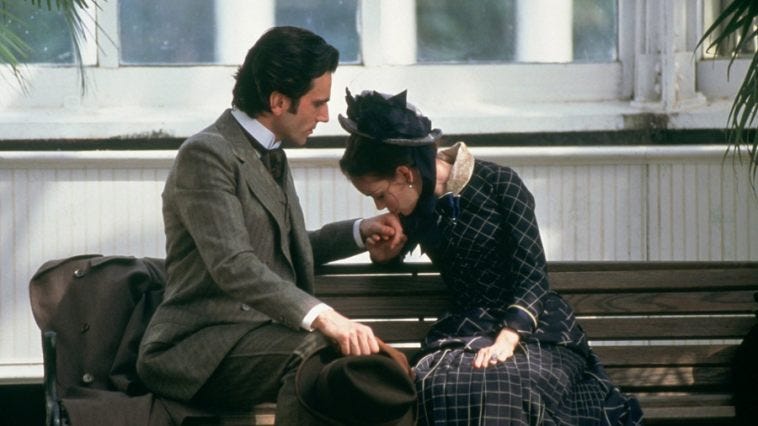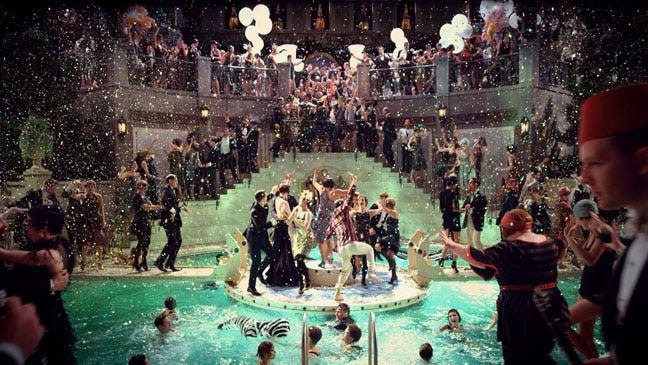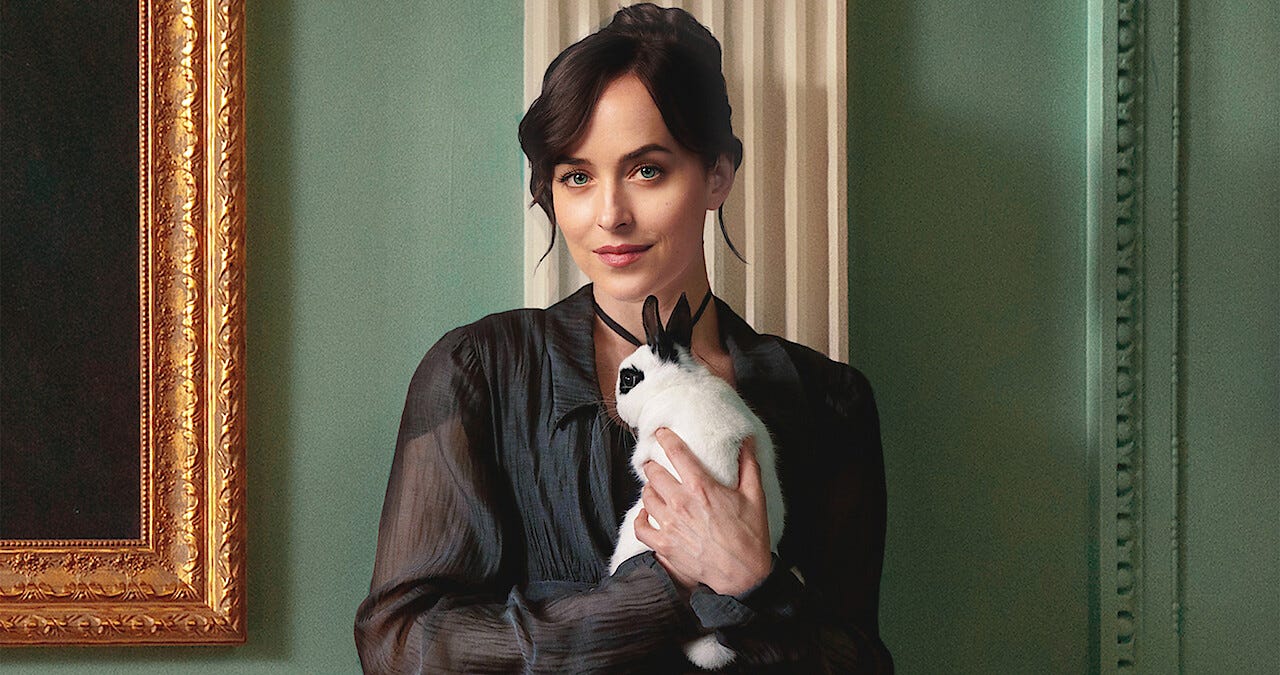There are many things that adaptations can do: they can expose a new facet of the book; they might bring the work to a new audience; they can even provide crucial and previously unknown backstory that gets incorporated into the canon — but adaptations are always an interpretation of the source work.
We talk a lot about what makes a good book adaptation, and some of the best (and worst) adaptations in our most recent episode of The Novel Tea podcast:
I find it helpful to return to this idea — interpretation — when thinking about adaptations.
One can’t decide if an adaptation is good or not without the crucial question of why: it involves careful consideration, and some critical thinking. And so, of course, as in every such exercise that involves opinions, my lists will differ from yours (I would be more alarmed to hear that we all had identical taste — that would be a veritable dystopia). I’m hoping you will share with us your thoughts on what makes a great adaptation, and some of your favorites!
Below are a few book to screen adaptations that I think are excellent or abominable (spoiler-free!). Obviously, this list is not exhaustive; to hear our opinions on many more adaptations (including Little Women, The Lion King, and Eragon) be sure to listen to our most recent podcast episode (Apple Podcasts | Spotify).
The Best
Normal People (2020)

Listeners of the podcast will know that I am not a fan of Sally Rooney. Despite repeated efforts to understand what everyone sees in her books, I just couldn’t appreciate them. So I was surprised to find that I loved the show.
When I first read Normal People, I gave up about 70% of the way through because I realized that I simply didn’t care what happened to the two main characters — watching the show, it was the complete opposite: I hoped against hope that they would get together in the end, and I was terrified that they wouldn’t.
The TV series smooths out a lot of edges of the book, in part thanks to the brilliant performances of the two leads, so that while book Marianne and Connell are annoying and self-important, show Marianne and Connell are sweet and endearing. Through the screen, we are let in on their vulnerabilities.
The visuals, music, direction, and cinematic choices are brilliant.
Watching the show, I think I finally understood why so many people love Sally Rooney’s books. While it didn’t totally eradicate my irritation with Marianne and the contrived circumstances that pull her and Connell apart, and then put them back together at random (I was exasperated by the last two episodes), I felt deeply for these characters.
For a show to take a book I hated and turn it into something I loved, while staying true to the spirit of the book — that is something truly magical: something every book adaptation should aspire to.
The Age of Innocence (1993)

This story of the Gilded Age, of restraint and passion and old vs. new is translated to the big screen by director Martin Scorsese, with the star cast of Daniel Day-Lewis, Michelle Pfeiffer, and Winona Ryder.
I had extremely high expectations for this movie; this is a favorite book of mine, and I couldn’t imagine how the movie would do it justice. Shockingly, it did.
This might be the best movie adaptation of a book I’ve ever seen.
The costuming, set design, and cinematography are all beautiful. Scorsese pays careful attention to the elements of the book that are important: not only the characters and their restrained emotions, but also thematic and symbolic elements, from the opera, to the flowers, to the visions of old New York.
As soon as I finished watching, I wanted to start all over from the beginning (“Each time you happen to me all over again” — I might say this about the movie itself).
Normally, I don’t love voiceover narrations in movie adaptations; it often feels like a lazy choice. But in this movie, it worked. I loved hearing Wharton’s beautiful words alongside gorgeous visuals.
I loved this movie so much that I find it hard to write about it. So I’ll just share another essay that delves even deeper into its beauty:
30 Years Later, The Age of Innocence Remains Scorsese’s Most Subtle Deconstruction of Misogyny [Lithub] (*note: there is a very annoying and pointless spoiler for The House of Mirth in the second paragraph — skip if you want to avoid the book being spoiled for you)
Gone With the Wind (1939)

Much has been said about this book, and movie, about its deeply troubling depictions of Black people, its white supremacy propaganda, and its deep seated racism.
But here is the thing: I love this book. I love this book, and it is problematic.
And the movie took a book that I loved and translated it to the screen with beautiful visuals, intricate costuming, and characters that stayed true to the spirit of the book. I had imagined Rhett Butler to appear more gruff and muscular than Clark Gable’s depiction (am I the only one who imagined a much larger mustache?) — but it didn’t matter, because I so believed his commitment to the character, and the chemistry between him and Vivien Leigh as Scarlett.
Scarlett is wonderful and maddening all at once, just like in the book. Melanie is sweet and pitiable and good and kind, just like in the book. The camerawork is stunning, especially when you consider when the movie was made (1939!).
All the choices made in this movie make it one that offers something new, when compared to the book — while staying true to the spirit and story of the original text.
The Worst
Anna Karenina (2012)
Where do I start with this adaptation?
One of the first things that stood out to my in this movie was the device it was using to depict the city scenes: a physical stage, with curtains and wings, on which characters are arranged, frozen, before the scene starts. I understand in theory what it was trying to do — show how performative and artificial the city is when compared to the country — but I think it failed miserably.
It makes scene transitions awkward and stilted, leaving little to no space for character development and story progression. I contrast the way stage/sets were used as a device in this movie to the use of theater and performance in The Age of Innocence (1993), and I am even more convinced of its failure in Anna Karenina (2012).
I also found Keira Knightly to be woefully miscast; I can reluctantly accept her as a Lizzie Bennet, but she is entirely wrong for Anna. She smiles far too much in this movie, making Anna into something she is not. Vronsky, too, is a nightmare: his depiction is not charming enough to convince the audience of why Anna and Kitty are both enamored by him.
Is there an adaptation of Anna Karenina that you believe does justice to the book? Let me know which one in the comments!
The Great Gatsby (2013)

My primary critique of this movie is this: this movie didn’t feel the way the book felt. It was aesthetically beautiful — the costumes, the sets, the colors, the lights. But the tone was off.
Gatsby wasn’t Gatsby enough. Daisy wasn’t Daisy enough. The choice to have all the background score be contemporary music was odd. I found the climax of the movie odd (I can’t put a finger on why).
The visual depiction of wealth and excess was done well, and the movie has a dream-like feel that goes well with the themes of delusion and false promises. But at some points it almost felt… too hazy and other worldly? As if all the characters were tripping on drugs. And Gatsby, to me, is about the reality of a shitty situation, even if the characters can’t accept it.
Persuasion (2022)

I probably don’t have to explain myself here; the book community has generally agreed that this is, by all accounts, a terrible adaptation. The breaking of the third wall, the lack of chemistry between the two leads, the odd casting choices — it’s all awful.
I will just add this: if Netflix wanted to make an Austen adaptation that was snarky, self-deprecating, and tongue-in-cheek funny, not only is Persuasion the worst choice, but they also had a readymade story for them in Northanger Abbey. Why not make age Catherine Morland up a bit and make her less naïve, and a bit more snarky? It could have worked!
It makes me nervous for the upcoming Pride and Prejudice.
What do you think are the best and worst book adaptations? Let us know!
— Shruti
Our Season 5 Book List
We will be reading nine books within the theme of adaptations, and watching plenty of screen adaptations! Below are the books we’ll be reading and discussing between now and June — to hear more about the books, what we’re excited about, and our general thoughts on adaptations, listen our latest podcast episode on The Novel Tea (Apple Podcasts | Spotify).
The Fall of the House of Usher by Edgar Allen Poe and What Moves the Dead by T. Kingfisher (a retelling of the former)
Jane Eyre by Charlotte Bronte
Wide Sargasso Sea by Jean Rhys — a retelling, of sorts, of Jane Eyre
Rebecca by Daphne du Maurier
A Gentleman in Moscow by Amor Towles
Emma by Jane Austen
All’s Well by Mona Awad — inspired by several Shakespeare plays
Our first book discussion, on The Fall of the House of Usher and What Moves the Dead, will be out on February 12th!
Until next time ~






My two favorite movie adaptations are both by Merchant/Ivory’s and are E.M. Forester books: A Room with a View starring Helena Bonham-Carter, Daniel Day-Lewis and Howard’s End with Emma Thompson, Helena Bonham-Carter & Anthony Hopkins. That new adaptation of Persuasion is an abomination.
I would like to nominate Never Let Me Go to the list of best